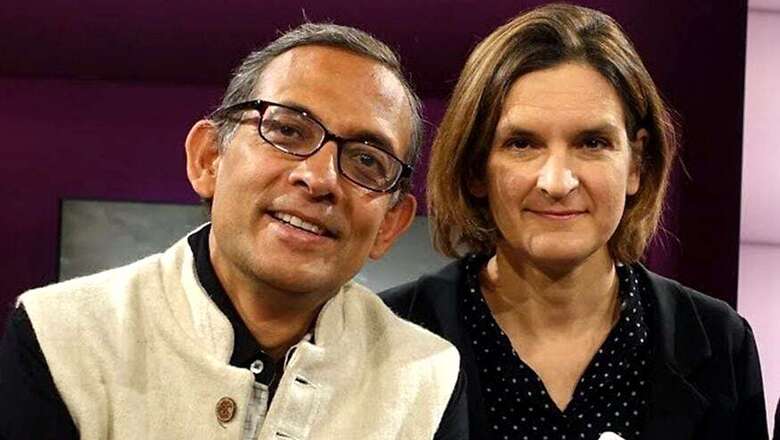
views
New Delhi: Nobel laureate couple Esther Duflo and Abhijit Banerjee have come up with a nine-point prescription for the 21-day lockdown period in the country due to coronavirus, suggesting the spread of awareness and building of health infrastructure to be better prepared for a pandemic.
The two are conducting an awareness campaign against the Covid-19 pandemic in West Bengal and held a quick survey in Karnataka which suggested people were aware of the disease but have no understanding of do’s and dont’s.
In an article in the Indian Express, the scholars gave their observations and nine points as under:
First, if the lockdown succeeds in flattening the curve and contains the overall spread of the disease, “the disease will continue to widen its ambit, as unknowing carriers reach new populations”.
There will be invisible agents tough to be identified. “As a result, the number of such apparently innocent contacts can be large; the son who comes home from Delhi could infect the entire extended family before it gets discovered.”
Second, they observe that in places like urban slums and other packed housing facilities, there will be difficulty in stemming the spread of the disease once someone contracts it.
Third, the spread of the disease is likely to accelerate after the curfew is lifted or it should be completely eliminated in three weeks, which is not likely to happen. The way the lockdown came without infecting many people, it has ensured that almost no one has immunity.
The curfew limited the number of infections “but the problem will be there with us in 21 days”.
This calls for a preparedness for the explosion of infection disease in pockets all over the country. The remote rural areas remain vulnerable with weak health infrastructure aggravating the situation. “Expect a tragedy, but what can be done to limit the extent of preventable tragedy?”
The couple pointed out the need was to “spread awareness in a way that at least one family member is aware of the symptoms of Covid19”.
Second, infections likely to spread so “avoid ostracism and concealment.” There is no replacement for honest reporting, which is the “key.”
Third, the administration should find multiple ways to report – either a hotline or the ANM, the Asha, etc.
Fourth, time and energy must be spent in training the rural health practitioners (including the unqualified) that can detect symptoms and also report them to the relevant authorities.
Fifth, this should be followed by collation of reports with efficiency and on time. This will enable the system to know “the new hotspots” and enable them to “focus on coordination of the evidence from across the country so that broad trends can be identified.”
While making the sixth point, they emphasised that in each state “a large mobile team of health professionals, doctors and nurses, with testing kits and, ideally, ventilators and other equipment be created.”
The new team can be stationed at new hotspots. “If the current lockdown is successful, the most plausible scenario is that there will still be many mini upsurges at different points of time (as against a single catastrophic burst, which would be much worse) and this allows the possibility of using the same team in multiple locations,” writes the duo.
In the seventh point, they urge the system to ensure that the new team has access to the necessary equipment needed by all health professionals and have the right to make use of all hospitals, private and public, as needed.
The nobel laureate couple demands that the government should be manifold bolder with the social transfers schemes as it will ensure an economic tragedy that can push people to defy orders.
The current offerings by the government are not sufficient and they’ve called it “small potatoes”. “If the point is to stop them from going out to find work and thereby spreading the disease, the amounts probably need to be much larger,” they write and call for a “universal coverage” while discouraging those who don’t need it.
This is also the time “to deploy the JAM (Jan Dhan, Aadhaar, Mobile) infrastructure that the government takes pride in,” in transferring the benefits of the schemes.
Finally, they have cautioned the government about the continuing of this “war effort” until the vaccine is found. After vaccination the government must work to upgrade the healthcare system — “let us be better prepared for the next time”.














Comments
0 comment